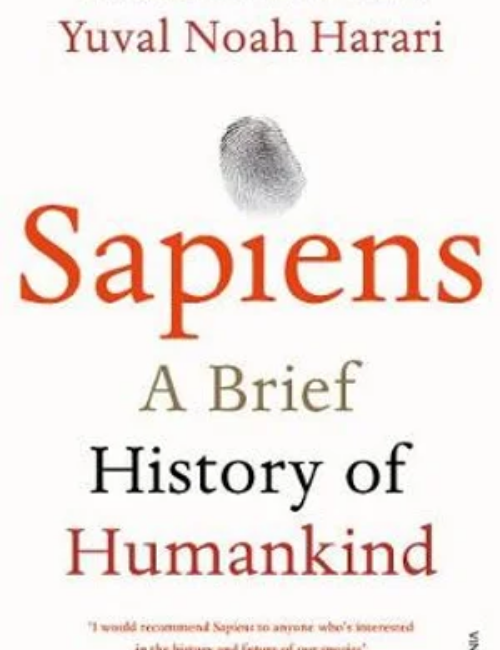I picked this up from my shelf as it’s in the Dymocks Top 101 Books for 2020. I have to read a book from this list for the Dymocks Reading Challenge 2020. It was an amazing read. If you only like light and fluffy then I suggest you take your time with this book. It’s a WYSIWYG type of book. The title suggests it is brief and that it is a history and that it is a history of humankind. This book is all of that and more. Humankind has been around for a very long time, so to fit it all into only 466 pages is no mean feat, but Harari somehow manages to do this.
I scribbled some notes on the back of a business card while reading this book. They’re very brief notes as business cards are rather small. I wrote just the page number and two or three words. I filled the back of the business card! This is something I very rarely do as books generally don’t have enough content that I would consider sharing with people and not give spoilers. But this book was different. I was making notes on the very first page and if I’d been sitting at a computer I probably would have reams of notes. It’s a good thing I’m not writing an essay on this book, it’d be longer than the book.
Essentially, Harari has gone back to the beginning of humankind (note: humankind, not mankind. Harari is very gender non-specific in this book, sometimes he uses the female pronoun and sometimes the male, it’s fairly inclusive). He starts with the big bang and ends with 2014 which is when this book was published. There is so much in between. I have learned so, so much…the issues is how much can I remember.
There is a section on religion. If you were thinking that you’re not religious? You might think again after reading this section. It’s mind blowing. How corporations are fiction created to keep people in line, just like religion. For the record, I’ve not been religious for a number of years, but I do like community and that’s why I’m involved in my synagogue.
Harari goes through topics such as foraging to farming and gives some indication of how we might have made that transition. He also speaks about how having made the transition to farming we have too much involvement in farming and we would not be able to go back to foraging.
One concept that totally blew my mind – yes, that happened a lot in this book – was the sila. Back in Sumer in around 3,000 BCE they used barley money. It was just barley but it was a common weight and so people used that for evaluating and exchanging all other goods and services. A sila was the most common measurement, it was roughly equivalent to one litre and they were mass produced. Salaries were also paid in silas of barley. When I first read this I thought Harari was indicating that the word ‘salary’ came from ‘sila’ and that makes some sense to my mind, but it actually comes from the Latin salarium. Fascinating.
Anyway, there are lots and lots of little things similar to this. It helps to make it readable and understandable. Should you wish to buy it here is a link to a reasonably priced copy

